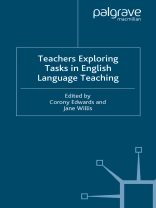Winner – British Council Innovation in English Language Teaching Award 2006 This book was written for language teachers by language teachers, with a view to encouraging readers to use more tasks in their lessons, and to explore for themselves various aspects of task-based teaching and learning. It gives insights into ways in which tasks can be designed, adapted and implemented in a range of teaching contexts and illustrates ways in which tasks and task-based learning can be investigated as a research activity. Practising language teachers and student professionals on MA TESOL/Applied Linguistics courses will find this a rich resource of varied experience in the classroom and a stimulus to their own qualitative studies.
Table of Content
About the Contributors List of Abbreviations Acknowledgements INTRODUCTION; Aims and Explorations into Tasks and Task-based Teaching; J.Willis Task-based Language Learning and Teaching: Theories and Applications; A.Shehadeh PART 1: IMPLEMENTING TASK-BASED LEARNING: CONTEXTS AND PURPOSES Developing from PPP to TBL: A Focused Grammar Task; L.Loumpourdi Integrating Task-based Learning Into a Business English Programme; P.Pullin-Stark Language as Topic: Learner-teacher Investigation of Concordances; R.Sheehan Storytelling with Low Level Learners: Developing Narrative Tasks; P.Kiernan Adding Tasks to Textbooks for Beginner Learners; T.Muller Using Language-focused Learning Journals on a Task-based Course; J.Moser PART 2: EXPLORING TASK INTERACTION: HELPING LEARNERS DO BETTER Exam-oriented Tasks: Transcripts, Turn-Taking and Backchanelling; M.Leedham Training Young Learners in Meaning Negotiation Skills: Does it Help?; S-M. Lee Task Repetition with 10-year-old Children; A.Pinter Collaborative Tasks for Cross-cultural Communication; D.Coulson PART 3: EXPLORING TASK LANGUAGE: LEXICAL PHRASES AND PATTERNS Interactive Lexical Phrases in Pair Interview Tasks; J.Hobbs Multi-word Chunks in Oral Tasks; M.Baigent Can We Predict Language Items for Open Tasks?; D.Cox PART 4: INVESTIGATING VARIABLES: TASK CONDITIONS AND TASK TYPES Fighting Fossilization: Language at the Task Versus Report Stages; C.Johnston Story-telling: Effects of Planning, Repetition and Context; W.Essig The Effect of Pre-task Planning Time on Task-based Performance; A.Djapoura Balancing Fluency, Accuracy and Complexity Through Task Characteristics; G.Birch Quality Interaction and Types of Negotiation in Problem-solving and Jigsaw Tasks; G.Poupore EPILOGUE: Teachers Exploring Research; C.Edwards References Index
About the author
MAGGIE BAIGENT teaches at the University of Bologna GREGORY CHARLES BIRCH teaches at Seisen Women’s College DAVID COULSON teaches at the British and American Studies Department, Niigata Women’s College, in north-west Japan DAVID COX is working on the opportunities offered by Webcam technology for language tuition ANTIGONE DJAPOURA works in a Private Language Institute in Cyprus WILLIAM ESSIG teaches in a Japanese university in Osaka JAMES HOBBS teaches at Iwate Medical University CRAIG JOHNSTON teaches at Kansai Gaidai College in Osaka, Japan PATRICK KIERNAN teaches at Tokyo Denki University, Japan SEUNG-MIN LEE (STEVE) teaches at the Korea National University of Education MARIA LEEDHAM is a teacher and teacher trainer at both Oxford University and Aston University, Birmingham LAMPRINI LOUMPOURDI (LANA) works at Aristotle University, Thessaloniki JASON MOSER works at a number of universities in Japan, including Osaka University THERON MULLER works in Japan ANNAMARIA PINTER works at the Centre for English Language Teacher Education (CELTE) GLEN POUPORE works in the Department of English, Konkuk University, Seoul, Korea and also for the Konkuk-Illinois Joint TESOL Certification Program, in Seoul PATRICIA PULLIN-STARK works for Fribourg University in Switzerland RAYMOND SHEEHAN teaches at Higher Colleges of technology in the United Arab Emirates ALI SHEHADEH teaches at the College of Languages and translation, King Saud University, Saudi Arabia












